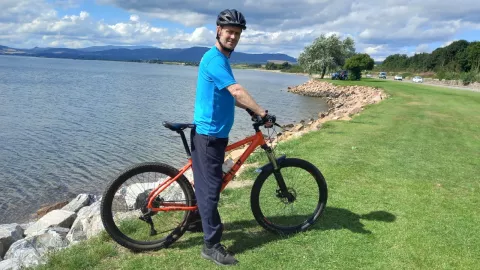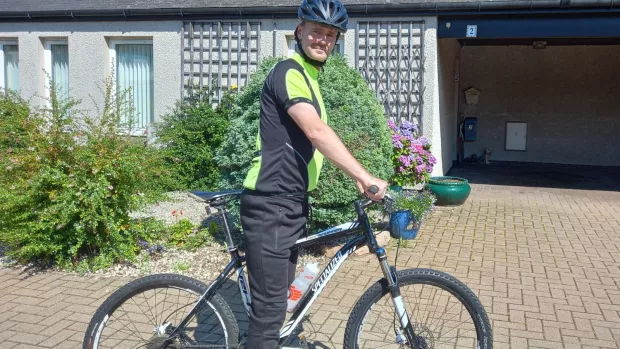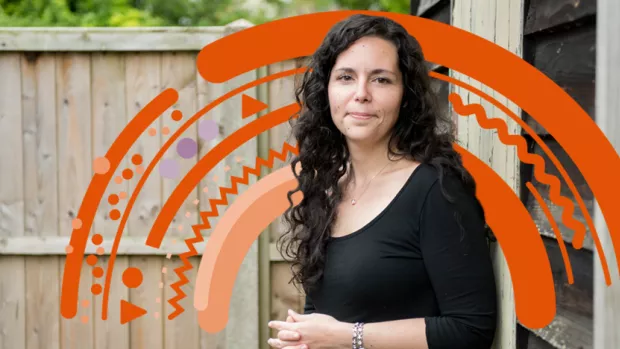
Cycling and my mental health
In a previous blog, Neil MacLeod, from Invergordon in the Scottish Highlands, talked about how riding his bike helps with the pain caused by his MS. Here, he talks about how cycling also benefits his mental health.
Several years ago, I was seeing a psychiatrist because I was feeling so low. Just down, down, down. Nothing was going right for me, and my MS was really affecting me badly. Then I got into cycling. It’s 100% improved my mental health.
Every morning I’ll go for a cycle. If I do between 20 and 40 miles a day, then I feel I’ve done something. I make myself go, no matter the weather. Rain, snow, wind, I’ve got to do my 20, 30, 40 miles a day.
Read Neil’s blog about how cycling benefits his physical health
I also believe that cycling helps me sleep soundly at night. I know it sounds weird, but it’s exercise and it makes me tired, so I sleep really well.
Somebody asked me if I wear headphones when I cycle. No, I don’t! If you wear headphones you can’t hear cars coming up behind you. And I want to hear the birds tweeting! I just love being outside on the bike. I look at the scenery, I stop and take photographs. It definitely benefits my mental as well as my physical health.
Cycling also improves my concentration. When I’m on the pushbike I’m in the zone, I’m focused. I’m always looking to see if there are any cars behind me, I’m constantly looking around. You can quite often hear me singing on the bike too! I sing anything, Happy Birthday or The Wheels on the Bus, just to get in the rhythm. One thing everybody says is that I’m always smiling on the bike!
I always come back fresher, chatting away about what I’ve seen. Most times when I get home, I fall off the bike because my legs are that wobbly and shaky. But within hours I’m ok. My friends say cycling is like a reset button for me.
Taking time out
There are still some days when I ignore everybody though. I shut the blinds and I turn my phone off. And everybody knows to just let me rest. I tell my mum first though. I say: “Don’t call me tomorrow, I’ll be sleeping all day. Just leave me to it.”
Safety first
I had a bad accident on my bike during lockdown. I skidded on the ice, went down and hit my head on the road. I was there for about an hour. Some poor man going to work found me in a ditch at 5.30 in the morning. I was on the side of the road, in the freezing ice. Luckily, I’m always wrapped up warm. I had a broken jaw, broken cheekbone, broken eye socket, and fractured skull. My helmet was smashed. A doctor said to me: “Keep that helmet forever, because that would've been your head if you hadn’t had it on, and you wouldn’t be here!”
I’ve always got my fluorescent jacket on, lights on my bike, and a helmet. I don’t know why but I’ve almost got a different helmet for every day of the week. I don’t wear the Lycra shorts though!
I have an app on my phone now that will phone the emergency services if I go offline for too long. And my Mum got me a red winter bike with big, grippy tyres as a Christmas present after my crash. We call it Big Red.
Just keep going
I’ve got the best cycling friends ever. And I’m in lots of cycle clubs now.
People have messaged me on Facebook and said: “Neil, you’re such an inspiration to us.” But I’m not. I’m just doing what I do. But I’m sharing my posts on Facebook to keep me going.
I’m really hoping talking about this will help someone else. If someone with MS reads this and wants to start cycling, but they aren’t able to get outside on a bike, I'd say, get a static bike. Stick the telly on, or put your headphones on, and just keep going.
If you can, just set your alarm clock, get out of bed. The hardest part of the day for someone with MS is getting out of bed in the morning. It could be the hardest part of the day for everyone but for people with MS it’s twice as hard, it really is.
But why not try it and see if you’ll feel better later. At nighttime you’ll think to yourself, “I’ve done something today”.




